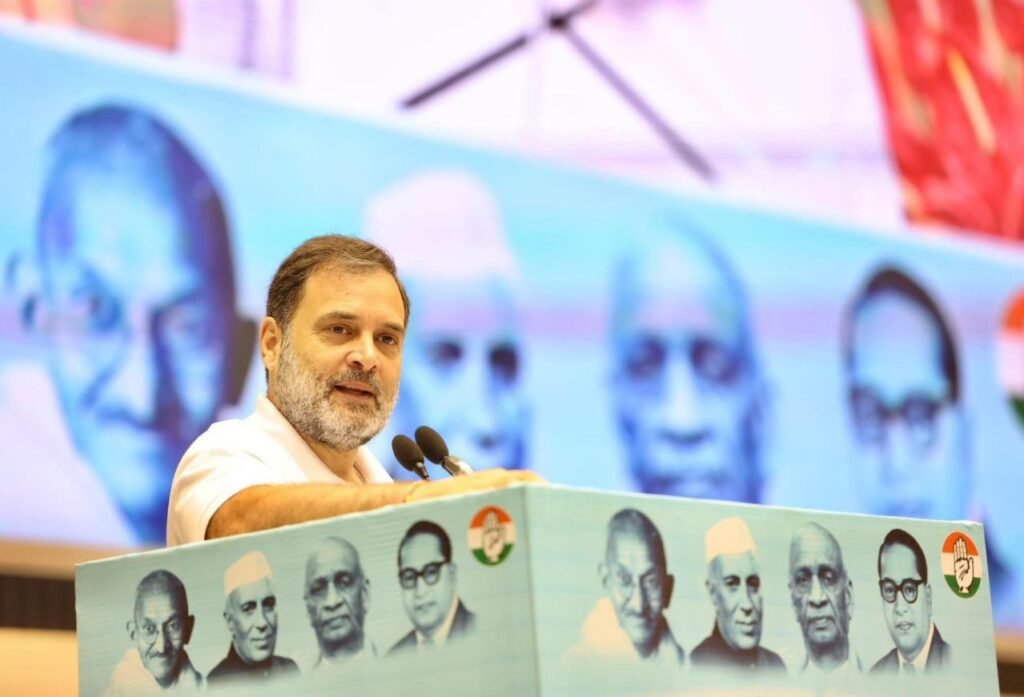In a politically charged statement that may send ripples across India’s democratic institutions, Congress leader and Lok Sabha Opposition Leader Rahul Gandhi on Saturday declared that the country’s electoral system is “already dead”, accusing the ruling Bharatiya Janata Party (BJP) and Prime Minister Narendra Modi of winning the 2024 general elections through a manipulated and flawed process. Speaking at a legal conclave at Vigyan Bhawan, themed ‘Constitutional Challenges: Perspectives and Pathways’, Gandhi alleged the election was rigged and claimed that his party is prepared to release damning proof to substantiate the charge.
Addressing a hall filled with legal minds, scholars, and political observers, Gandhi began by rejecting the title of a “king”, which his supporters had chanted in slogans like “Is desh ka raja kaisa ho, Rahul Gandhi jaisa ho”. In a direct rebuttal, Gandhi stated, “No boss, I’m not a king. I don’t want to be one. I’m against the very concept of kingship.” The former Congress president then launched into a comprehensive critique of the Election Commission of India, suggesting that the institution had been compromised and was no longer serving as the constitutional guardian it was meant to be.
He referred to fresh evidence collected by the Congress party from a constituency in Karnataka where 1.5 lakh out of 6.5 lakh voter entries were allegedly identified as fake through physical verification of photos and names. Gandhi described the data as “an atom bomb” for India’s electoral process and promised that its release would shake the system. “We are going to prove, without a shred of doubt, that not only was the Lok Sabha election rigged—it was rigged on a scale that could change the government,” he added.
According to Gandhi, the BJP-led government continues to hold power through a “very thin majority,” and if the alleged vote manipulation had not occurred, the outcome of the election would have been entirely different. He further speculated that the number of tampered seats could be as high as 70 to 100. The Congress leader claimed he had always held suspicions about the integrity of elections in India since 2014, particularly during the Gujarat and Rajasthan state elections. He said he had refrained from speaking up previously because he lacked irrefutable evidence. However, Gandhi now says he has proof that has left even political analysts and party leaders “falling off their chairs in disbelief.”
In his remarks, Gandhi emphasized the systemic erosion of constitutional institutions, alleging that the Election Commission had been “obliterated and taken over.” This, he said, jeopardizes the very fabric of India’s democracy, as the integrity of the voting system is foundational to public trust.
Why This Is Important
Rahul Gandhi’s claims are more than just political rhetoric—they represent an open challenge to the legitimacy of India’s democratic process. If proven, his allegations could significantly undermine public confidence in electoral outcomes and further polarize the political landscape. His statements also invite national and international scrutiny into the functioning of India’s Election Commission, which has so far stood as a relatively independent body in the country’s institutional framework.
Moreover, the timing of the allegations—months after a hotly contested general election—raises critical questions about accountability, transparency, and due process. Whether or not the proof Gandhi claims to possess will pass public or judicial scrutiny, the sheer gravity of the charges warrants a serious and transparent investigation. In an era where disinformation can spread quickly, such claims from a national political figure must either be credibly substantiated or responsibly debunked.
For society as a whole, this moment underlines the importance of safeguarding electoral integrity. If voters lose faith in the process that enables them to choose their leaders, it can lead to long-term civic disengagement, instability, and erosion of democratic norms. Ensuring that every vote is genuine, counted, and unmanipulated is not just the responsibility of the Election Commission but of all stakeholders—political parties, civil society, judiciary, and the media.
This news has been compiled from web media sources, including international news websites.
